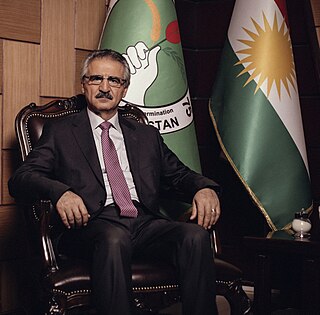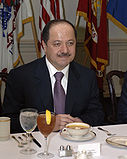Iraq is a federal parliamentary representative democratic republic. It is a multi-party system whereby the executive power is exercised by the Prime Minister of the Council of Ministers as the head of government, the President of Iraq as the head of state, and legislative power is vested in the Council of Representatives.

The Patriotic Union of Kurdistan is a political party active in Kurdistan Region and the disputed territories in Iraq. The PUK describes its goals as self-determination, human rights, democracy and peace for the Kurdish people of Kurdistan and Iraq. The PUK is currently under the leadership of Bafel Talabani. The PUK was founded in 1975 by Jalal Talabani, Nawshirwan Mustafa, Fuad Masum, Adel Murad, Ali Askari and Abdul Razaq Feyli Dawood Mohammed Ali. All presidents of Iraq under the 2005 constitution have been from this party.
The Democratic Patriotic Alliance of Kurdistan (DPAK) sometimes referred to simply as the Kurdistan Alliance (KA) is the name of the electoral coalition first presented as a united Kurdish list in the January 2005 election in Iraq. Elections were held simultaneously for the assembly of Kurdistan Region. The Alliance represents a coalition of the two main Kurdish parties, the Kurdistan Democratic Party and the Patriotic Union of Kurdistan

On 19 May 1992 elections were held to the Kurdistan National Assembly, the parliament of the Kurdistan Region in Iraq. At the time, the National Assembly had 105 seats, of which 5 were reserved for the Assyrian community. Parties had to achieve more than 7% of the vote to be elected. There were 178 polling stations around the region.

Kurdistan Region (KRI) is a semi-autonomous federal region of the Republic of Iraq. It comprises four Kurdish-majority governorates of Arab-majority Iraq: Erbil Governorate, Sulaymaniyah Governorate, Duhok Governorate, and Halabja Governorate. It is located in northern Iraq, which shares borders with Iran to the east, Turkey to the north, and Syria to the west.

Masoud Barzani is a Kurdish politician who has been leader of the Kurdistan Democratic Party (KDP) since 1979, and was President of the Kurdistan Region of Iraq from 2005 to 2017.

The Kurdistan Regional Parliament, also known as Kurdistan Parliament - Iraq, or simply Perleman, is the parliament of the Kurdistan Region in Iraq. It is made up of representatives from the various parties, lists or slates that are elected every four years by the inhabitants of Kurdistan Region, which is currently governed by the Kurdistan Regional Government. In 2009 an amendment was applied to the Kurdistan Election Law of the year 1992, changing the name of the body to Kurdish Parliament from its previous name: the Kurdish National Assembly.

The Iraqi Kurdish Civil War was a civil war that took place between rival Kurdish factions in Iraqi Kurdistan during the mid-1990s, mostly between the Patriotic Union of Kurdistan and the Kurdistan Democratic Party. Over the course of the conflict, Kurdish factions from Iran and Turkey, as well as Iranian, Iraqi and Turkish forces, were drawn into the fighting, with additional involvement from American forces. Between 35,000 and 40,000 fighters and civilians were killed.

The Kurdistan Region parliamentary elections of 2009 took place on 25 July 2009. A total of 2.5 million citizens of Kurdistan Region were eligible to vote for the parliamentary and presidential elections. People currently living outside Kurdistan Region were not allowed to vote. The elections followed the 2005 Kurdistan Region parliamentary election. The parliamentary elections coincided with the direct election of the President of Kurdistan. Unlike the parliamentary elections in 2005, the president of Kurdistan was to be chosen directly through popular votes. A referendum to approve the constitution of Kurdistan Region originally planned for the same day was put back to 1 August.

The Gorran Movement or just Gorran (Change) is a Kurdish political party in the Kurdistan Region of Iraq. The party is led by Dana Ahmed Majid, it was formerly under the leadership of Omar Said Ali, and was founded in 2009 by Nawshirwan Mustafa. Gorran is the sixth largest party in the Kurdistan Region, having lost almost all of its voters (95%) since its foundation, and is now no longer represented in the Iraqi parliament.

The Kurdistan Democratic Party, usually abbreviated as KDP or PDK, is the ruling party in Iraqi Kurdistan and the senior partner in the Kurdistan Regional Government. It was founded in 1946 in Mahabad in Iranian Kurdistan. The party states that it combines "democratic values and social justice to form a system whereby everyone in Kurdistan can live on an equal basis with great emphasis given to rights of individuals and freedom of expression."

Hikmat Muhammad Karim, known as Mala Bakhtiyar or Mala Bakhtiar, is a prominent political leader and senior Iraqi Kurdish politician. He is a commander and General of the Kurdish PUK Peshmerga forces and is considered one of the most powerful people in Iraq. Mala Bakhtiar previously served as the chief of the Executive Bureau of the Patriotic Union of Kurdistan. Currently, he is the joint leader of the Supreme Political Council of the Patriotic Union of Kurdistan (PUK), alongside Kosrat Rasul Ali.

The 1983–1986 Kurdish rebellions in Iraq occurred during the Iran–Iraq War as PUK and KDP Kurdish militias of Iraqi Kurdistan rebelled against Saddam Hussein as part of the Iraqi–Kurdish conflict, in an attempt to form an independent state. With Iraqi government forces occupied by the Iran-Iraq War, Kurdish Peshmerga succeeded in taking control of some enclaves, with Iranian logistic and sometimes military support. The initial rebellion resulted in stalemate by 1985.

The Iraqi–Kurdish conflict consists of a series of wars, rebellions and disputes between the Kurds and the central authority of Iraq starting in the 20th century shortly after the defeat of the Ottoman Empire in World War I. Some put the marking point of the conflict beginning to the attempt by Mahmud Barzanji to establish an independent Kingdom of Kurdistan, while others relate to the conflict as only the post-1961 insurrection by the Barzanis.

Kurdish separatism in Iran or the Kurdish–Iranian conflict is an ongoing, long-running, separatist dispute between the Kurdish opposition in Western Iran and the governments of Iran, lasting since the emergence of Reza Shah Pahlavi in 1918.
The insurgency by the Kurdish Democratic Party of Iran surged in 1989, lasting until 1996, as part of the Kurdish separatism struggle. The eruption of the conflict in July 1989 was caused by the assassination of KDPI leader Abdul Rahman Qassemlou by suspected Iranian government agents. The most violent episodes took place in 1990 and 1991, when Kurdish soldiers launched massive attacks on Iranian military bases in Kurdish areas of Iran. This brought heavy retaliation from the Iranian government, aiming to eradicate the KDPI leadership by assassinating Sadegh Sharafkandi and other KDPI leaders in 1992 in order to disable the Kurdish party's ability to function. The conflict faded with the effective targeted assassination policy of Iran and by 1996 KDPI was no longer able to function militarily and announced a unilateral ceasefire. The conflict claimed hundreds of lives, mostly Iranian government troops and Kurdish militants.

Parliamentary elections were held in the Kurdistan Region of Iraq on 21 September 2013. They were the fourth parliamentary elections in Kurdistan Region since 1992. The candidates were competing for a total of 111 seats out of which 11 seats were reserved for minorities. According to the Iraqi High Electoral Commission, there were 366 female and 736 male candidates for the elections. A total of 2,653,743 people were eligible to vote throughout the three provinces of Erbil, Sulaymaniyah and Dohuk of which 74% cast their ballots.

An independence referendum for the Kurdistan Region of Iraq was held on 25 September 2017 in Kurdistan Region, with preliminary results showing approximately 92.73 percent of votes cast in favour of independence. Despite reporting that the independence referendum would be non-binding, the autonomous Kurdistan Regional Government (KRG) characterised it as binding, although they claimed that an affirmative result would trigger the start of state building and negotiations with Iraq rather than an immediate declaration of independence of Kurdistan. The referendum's legality was rejected by the federal government of Iraq and the Federal Supreme Court. KRG eventually conceded and accepted the Supreme Court’s ruling that no Iraqi governorate is allowed to secede.

Parliamentary elections took place in Kurdistan Region on 30 September 2018 to elect Parliament. The election came a year after a failed bid for independence and left the ruling Kurdistan Democratic Party (KDP) with 45 seats, that positioning it to lead the next regional government. Announcement of the results was delayed for three weeks. The KDP's historic rival and junior coalition partner in government, the Patriotic Union of Kurdistan (PUK), was in second place with 21 seats. The results suggest that Masoud Barzani’s KDP will take a dominant position in Kurdish politics.

The president of Kurdistan Region is the head of semi-autonomous Kurdistan Region in northern Iraq. They are part of the Kurdistan Presidency Council. The current president of Kurdistan Region is Nechirvan Barzani, who assumed office on 10 June 2019.


















